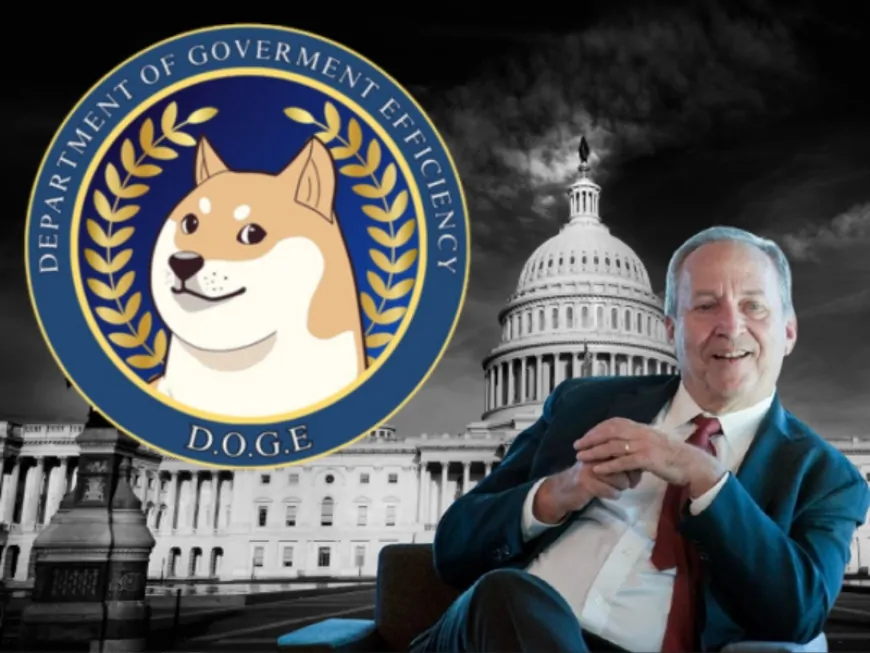Larry Summers Says DOGE Plan Could Hurt US Economy, Warns of "Disastrous Failure"
The former Treasury Secretary warns that the government’s DOGE initiative may weaken institutions like the IRS and increase the national deficit.

Former Treasury Secretary Larry Summers has issued a strong critique of the government’s DOGE policy initiative, describing it as a misguided strategy that could lead to a financial and institutional breakdown. Speaking on the All-In Podcast, Summers said the plan, though aimed at reforming government spending, may do more damage than good if current steps continue.
DOGE—short for “Decentralized Operations for Government Efficiency”—is a federal initiative aimed at cutting costs and reducing bureaucracy. While the intent is to make government leaner and more responsive, Summers argued that key agencies are being weakened in the process, putting essential services and revenue collection at risk.
IRS Workforce Cuts Raise Alarms Over Tax Collection
One of Summers’ major concerns involves the Internal Revenue Service (IRS), which is currently undergoing substantial staffing cuts. Earlier this year, the White House introduced a plan to shrink the IRS through buyouts and deferred resignations, aiming to reduce federal spending.
Summers warned that gutting the IRS could result in a significant drop in tax revenue, particularly from high-income earners who typically require more detailed audits.
“We are laying off the very people responsible for ensuring the wealthiest Americans pay their fair share,” Summers said.
According to IRS data, audits of individuals earning over $10 million per year have declined sharply over the past decade. Summers believes further weakening the agency could widen the gap between taxes owed and taxes actually collected—known as the “tax gap.”
This gap is already estimated to exceed $600 billion annually. By cutting auditors and investigators, Summers argued, the government could lose far more in uncollected taxes than it saves in reduced payroll costs.
Support for Reform, But Not at the Expense of Functionality
Despite his criticism, Summers acknowledged that the US government is in need of reform. He agreed with fellow podcast guest Ezra Klein that certain departments have grown inefficient and that political leaders have at times lost touch with core public concerns.
However, Summers emphasized that reform must be strategic and not rely on what he described as "blunt, destructive" methods.
“We can’t treat institutions like the IRS as villains,” Summers said. “They play a vital role in holding the system together.”
He compared the government’s current approach to trying to fix a watch by smashing it with a hammer—pointing out that care, precision, and balance are essential when managing a system as complex as the US economy.
Concerns About Economic Fallout and Deficit Growth
Summers also expressed concern about the long-term financial effects of DOGE. With reduced tax revenue, he believes the initiative could actually worsen the national deficit—directly undermining one of its core goals.
“The path we’re on could leave the US in deeper debt, not less,” he warned.
The economist said that while cutting costs might appeal to some voters, it cannot come at the expense of core infrastructure like tax enforcement, cybersecurity, or compliance systems. In his view, without a reliable way to collect revenue, the government will struggle to fund critical services and could face mounting borrowing needs.
Debate Over Tax Enforcement and Government Overreach
Podcast host and investor Chamath Palihapitiya challenged Summers by sharing his personal experience with annual audits. He argued that aggressive tax enforcement can be overly intrusive. However, Summers responded that the issue is not excessive audits of middle- or upper-middle-income individuals, but rather the under-auditing of ultra-wealthy taxpayers.
IRS enforcement has been in decline for years, particularly for those at the top end of the income scale. According to Treasury data, audit rates for high-income earners have dropped by over 70% since 2010.
Summers emphasized that increasing the audit rate for multimillionaires and billionaires would likely boost government revenue significantly—and that shrinking the IRS does the opposite.
Context of Past Economic Criticism
Summers has frequently voiced concerns about poorly designed economic strategies. He previously criticized President Trump’s tariff policies, calling them self-defeating and harmful to both US businesses and international trade.
On the podcast, he said current actions risk repeating similar mistakes—policies that aim to sound tough but may end up hurting the very system they’re supposed to improve.
“You don’t fix a broken machine by smashing its parts. You identify what’s wrong and invest in making it work better.”
Summers expressed concern that the current direction could result in a weakening of crucial government institutions, erode public confidence, and put even more strain on the nation’s finances. He pointed out that while the intent behind DOGE is to streamline government functions, any reform is bound to fail without a solid foundation of efficient tax collection and institutional integrity.
At the time of writing, the White House has yet to respond to Summers' criticism. His comments add another layer to the ongoing debate over how to balance reform with the need for a stable and reliable system—something he believes is being jeopardized by the current approach.
Also Read: Elon Musk Reportedly Stepping Back from DOGE—Tesla Stock Surges in Response





























































